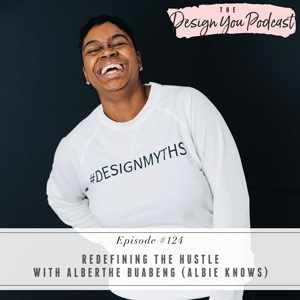
Oh my gosh friends, what an inspiring episode I have for you today! I could not be more excited to bring this incredible woman onto the podcast. If you’re looking for permission to be exactly who you want to be, look no further! Today’s guest is here to show you how to shake things up, put yourself first, and step into a super true version of you.
Idea machine, interior designer, and founder of the Design Influence podcast Albie Buabeng joins me this week to talk about the waves she’s been making in her personal and professional life. Her desire to contribute to the design community recently manifested in her adaptation of the #sharethemic initiative on Instagram for the home industry. The inaugural activation of this event brought together over 100 members of the design community to spark conversation and spearhead change amidst a modern-day civil rights movement. She’s here today to tell us all about it!
Join us this week where we’ll discuss all things hustle and why staying true to yourself is the only way to thrive. We’ll explain why you need to be willing to get uncomfortable in life in order to grow, and why creating white space in our lives is the only way to pick up the path to contentment. Success is often right in front of us, we just need to make the time to see it. Inspiring is an understatement – you’re going to love this episode!
If you want to keep this conversation going, you have to join my free Design You Podcast community on Facebook. We have great conversations over there about the podcast episodes and our podcast guests are in there too! So head on over and I’ll see you there!





